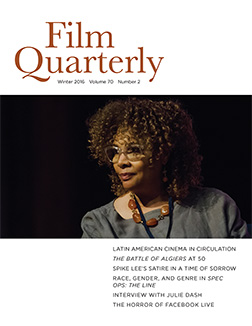Feminist film theory is a theoretical film criticism derived from feminist politics and feminist theory influenced by second-wave feminism and brought about around the 1970s in the United States. With the advancements in film throughout the years feminist film theory has developed and changed to analyse the current ways of film and also go back to analyse films past. Feminists have many approaches to cinema analysis, regarding the film elements analyzed and their theoretical underpinnings.

Crime films, in the broadest sense, is a film genre inspired by and analogous to the crime fiction literary genre. Films of this genre generally involve various aspects of crime and its detection. Stylistically, the genre may overlap and combine with many other genres, such as drama or gangster film, but also include comedy, and, in turn, is divided into many sub-genres, such as mystery, suspense or noir.
The Edinburgh Review is the title of four distinct intellectual and cultural magazines. The best known, longest-lasting, and most influential of the four was the third, which was published regularly from 1802 to 1929.
Neo-noir is a revival of film noir, a genre that had originally flourished during and after World War II in the United States—roughly from 1940 to 1960. The French term film noir translates literally to English as "dark film", because they were quite dark both in lighting and in sinister stories often presented in a shadowy cinematographic style. Neo-noir has a similar style but with updated themes, content, style, and visual elements.
Claire Johnston (1940–1987) was a feminist film theoretician. She wrote seminal essays on the construction of ideology in mainstream cinema.
Television studies is an academic discipline that deals with critical approaches to television. Usually, it is distinguished from mass communication research, which tends to approach the topic from a social sciences perspective. Defining the field is problematic; some institutions and syllabuses do not distinguish it from media studies or classify it as a subfield of popular culture studies.

Basil Dearden was an English film director.

Film Quarterly, a journal devoted to the study of film, television, and visual media, is published by University of California Press. It publishes scholarly analyses of international and Hollywood cinema as well as independent film, including documentary and animation. The journal also revisits film classics; examines television and digital and online media; reports from international film festivals; reviews recent academic publications; and on occasion addresses installations, video games and emergent technologies. It welcomes established scholars as well as emergent voices that bring new perspectives to bear on visual representation as rooted in issues of diversity, race, lived experience, gender, sexuality, and transnational histories. Film Quarterly brings timely critical and intersectional approaches to criticism and analyses of visual culture.
Linda Ruth Williams is Professor of Film Studies in the College of Humanities at the University of Exeter, UK. Her special interests include sexuality and censorship in cinema and literature, women in film, psychoanalytic theory and D. H. Lawrence.
New Extreme Films describes a range of transgressive films made at the turn of the 21st century that sparked controversy, and provoked significant debate and discussion. They were notable for including graphic images of violence, especially sexual violence and rape, as well as explicit sexual imagery.

Pam Cook is Professor Emerita in Film at the University of Southampton. She was educated at Sir William Perkins's School, Chertsey, Surrey and Birmingham University, where she was taught by Stuart Hall, Richard Hoggart, Malcolm Bradbury, and David Lodge. Along with Laura Mulvey and Claire Johnston, she was a pioneer of 1970s Anglo-American feminist film theory. Her collaboration with Claire Johnston on the work of Hollywood film director Dorothy Arzner provoked debate among feminist film scholars over the following decades.

The British Board of Film Classification (BBFC), previously the British Board of Film Censors, is a non-governmental organisation founded by the British film industry in 1912 and responsible for the national classification and censorship of films exhibited at cinemas and video works released on physical media within the United Kingdom. It has a statutory requirement to classify all video works released on VHS, DVD, Blu-ray, and, to a lesser extent, some video games under the Video Recordings Act 1984. The BBFC was also the designated regulator for the UK age-verification scheme, which was abandoned before being implemented.

Murray Pomerance is an independent Canadian film scholar and author living in Toronto, Ontario, Canada, and adjunct professor in the School of Media and Communication at RMIT University, Melbourne.
Maurice Hatton was a British screenwriter and film director.
Colin Young was a British film educator, chairman of the School of Theater, Film and Television at UCLA, founder of the film program at Rice University, Houston, Texas, and the first director of the British National Film and Television School. He was awarded a BAFTA Academy Fellowship Award, the highest honor of the British Academy of Film and Television Arts, in 1993.
Annette Frieda Kuhn, FBA is a British author, cultural historian, educator, researcher, editor and feminist. She is known for her work in screen studies, visual culture, film history and cultural memory. She is Professor and Research Fellow in Film Studies at Queen Mary University of London.
Stella Bruzzi, FBA is an Italian-born British scholar of film and media studies and currently Dean of Arts and Humanities at University College London.
Charlotte Brunsdon is a professor of film and television studies at the University of Warwick and researcher. She was one of the principal researchers of the Nationwide Project.
Sarah Street is professor of Film and Foundation Chair of Drama at University of Bristol.





